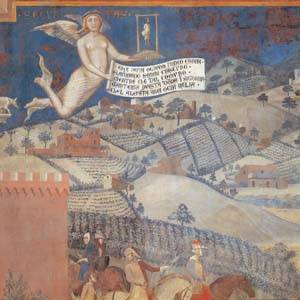
This compelling, unusual study in intellectual history profiles a political enmity and biographical affinity between two mid-20th century figures: the non-Party communist historian Isaac Deutscher and the liberal philosopher Isaiah Berlin. The two of them had, superficially, a similar trajectory. Isaac and Isaiah were born within a couple of years of each other, both from middle-class Jewish families in eastern Europe – Berlin’s a family of successful capitalists in Riga, Deutscher’s from a more petit-bourgeois background in a small town near Krakow – and both fled to England, where they built careers much more successful than in their native Poland and Latvia.
Their politics were both decisively shaped by childhood experience – Berlin seeing a policeman mobbed by a revolutionary crowd in 1917 served to explain a lifelong defence of the established order, while Deutscher’s memory of a pogrom in the aftermath of Polish independence the following year founded a fierce internationalism and socialism. Their stock has fallen since the 1980s, with Berlin’s concept of “negative freedom” tainted by Margaret Thatcher’s (unreciprocated) enthusiasm, and Deutscher’s faith in the possibility of reform in the communist world first seemingly vindicated and then comprehensively destroyed by Gorbachev. But the reason for this dual biography is more personal – the revelation that Berlin was instrumental in denying Deutscher the academic job he craved.
After years spent struggling to balance daily punditry and Kremlinology with the discipline of history – the complex, morally ambiguous biographies of Stalin and Trotsky, for which he is best remembered – Deutscher applied for a job at the then new University of Sussex, and was considered a shoo-in. Berlin, on Sussex’s advisory board, immediately torpedoed the application by writing a letter to the Vice-Chancellor. Caute, who studied under Berlin at Oxford, begins the book by recalling a conversation in the early 1960s, when Berlin asserted that he could never imagine “sitting at the same table” as Deutscher.
From here, Caute plots the dual personal and political trajectories of the two writers, and culminates with the dramatic revelation of Berlin’s letters to Sussex. The result is a wholly fascinating if uneven book, which leaps from biographical detail to personal reminiscence to close readings of the two’s works. He attempts to take seriously Berlin’s objections to Deutscher, and eventually finds them to be unfair, exonerating him from the claims of “lack of scruple” and “falsification”, though not from a tendency as a journalist to see what he wanted to see in the post-Stalin USSR, from picking his sympathies with Stalin’s victims as if only Trotskyists died in the Gulag, or from an often wildly inaccurate bent for prophecy. He also exonerates Berlin himself from the accusation that he stepped in to prevent Deutscher’s appointment because “a Marxist shouldn’t be allowed to teach history”, as has been claimed; Berlin had friendships with historians who were far more apologetic towards the Soviet Union than Deutscher ever was, such as E.H. Carr and Christopher Hill. But they were English.
Deutscher engaged with Berlin once, writing a negative review of Historical Inevitability, which traces a lineage of determinism culminating in Marx and Lenin. Berlin, however, obsessively saw Deutscher as an embodiment of the ruthless Bolshevik who would put an intellectual opponent to death for the sake of historical progress; and also an embodiment of what, in a lapse into Russian, Berlin called a parshivy yevrey (“mangy Jew”) tendency towards abstraction and rancour, so unlike the placid English intellectual climate in which he positively lolled.
Although he wrote in favour of intellectual nonconformity, Berlin never took a position that put him at any serious risk, becoming a very successful member of the British establishment. Deutscher, however, though adopted by the young New Left in the last couple of years of his life, managed at one point or another to offend Trotskyists, Stalinists, liberals, conservatives, Zionists and anti-Zionists. One of the services of this book is to recall Deutscher’s intellectual courage and his remarkable talents as a historian – if not, Caute claims, as a journalist. Although there is a conspicuous fairness in Isaac and Isaiah, Caute gradually becomes a decisive if highly critical advocate:
Berlin habitually walked through open doors while impressively demonstrating that they were in danger of being torn from their hinges. Deutscher, by contrast, hurled himself against gates genuinely padlocked by the prevailing Cold War culture. And that may be why, when you climb the main staircase of the London Library (of which both were members), you encounter Berlin’s portrait, not Deutscher’s.
David Caute's Isaac and Isaiah: the Covert Punishment of a Cold War Heretic is published by Yale University Press

